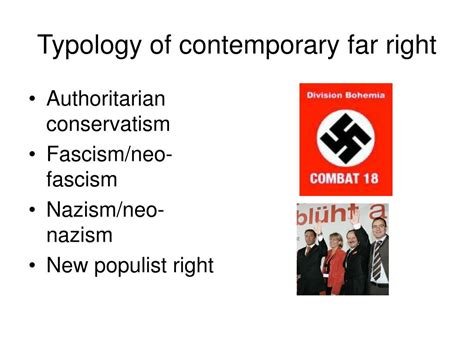
Unlocking the Allure of Far-Right Ideologies: Strategies for Understanding and Counteraction
Far-right ideologies have taken center stage in contemporary discourse, leaving an indelible mark on societies worldwide. To comprehend the magnetic pull of these ideologies, it’s imperative to decode the psychological factors behind their appeal and devise effective countermeasures. In this comprehensive article, we will dissect the allure of far-right ideologies by delving into historical contexts, psychological drivers, socio-economic factors, leadership dynamics, and the radicalization process. Through case studies and examples, we aim to shed light on the profound impact of these ideologies and the imperative need to counter their appeal in our increasingly polarized world.
Historical Context The roots of far-right ideologies can be traced to moments of societal upheaval and economic uncertainty. They tend to surface in response to perceived threats to traditional values, identities, and ways of life. Historical figures such as Adolf Hitler and Benito Mussolini exemplify how far-right ideologies can gain traction during crises. Far-right leaders have historically capitalized on discontent, exploiting fears, and offering simplistic solutions to complex problems.
Psychological Factors The appeal of far-right ideologies hinges on their ability to tap into deep-seated psychological triggers. Fear and insecurity are central, as these ideologies promise stability and certainty through authoritarian leadership during uncertain times. The yearning for belonging and identity drives individuals to extremist groups, where they find camaraderie and purpose. Media manipulation and propaganda further fuel these psychological drivers, creating a distorted reality that fosters allegiance.
Us vs. Them Mentality Far-right ideologies thrive on creating an “us vs. them” narrative, identifying and scapegoating individuals or communities as enemies. This tactic strengthens group cohesion, fostering unity among followers who perceive themselves as part of an exclusive, superior group. This approach makes followers more resistant to alternative viewpoints, locking them into their beliefs.
Social and Economic Factors Social and economic factors significantly contribute to far-right ideologies’ appeal. Economic anxiety and inequality breed resentment and disillusionment, attracting some to extremist ideologies. Rapid societal changes, like increased immigration and cultural shifts, evoke nostalgia for a perceived “golden age.” Far-right ideologies capitalize on this sentiment, offering a return to a romanticized past as a solution to modern challenges.
Authoritarianism and Leadership Far-right movements often feature strong, authoritarian leaders who promise decisive action and stability. Followers are drawn to these leaders’ strength and vision, believing they can protect their interests and restore order. This admiration fosters blind loyalty and unquestioning obedience, creating a cult-like devotion to the ideology.
Radicalization Process The internet and social media have transformed the radicalization process, making it easier for far-right ideologies to attract and influence individuals. Online echo chambers and extremist communities facilitate rapid propaganda dissemination and recruitment. Social media algorithms create personalized content feeds that reinforce users’ biases, contributing to radicalization.
Psychology of Belief Cognitive biases play a significant role in the appeal of far-right ideologies. Confirmation bias leads individuals to seek information that aligns with their beliefs, further solidifying their commitment. Selective exposure exacerbates this echo-chamber effect, as individuals gravitate towards media and communities that reaffirm their worldview.
The Appeal of Simplistic Solutions Far-right ideologies often present simple solutions to complex problems, which can be alluring in our increasingly complex world. Promises of easy answers empower followers, making them feel they can shape the future. However, these solutions often oversimplify issues, leading to ineffective or harmful policies.
Psychological Drawbacks Embracing far-right ideologies can have psychological drawbacks, leading to cognitive dissonance when individuals encounter conflicting information. To cope, followers may engage in rationalization, further entrenching extremist beliefs.
Case Studies and Examples Analyzing specific far-right movements and their appeal offers insights into their varied strategies. For instance, the alt-right leveraged social media to disseminate propaganda effectively. Nationalist movements have used xenophobia and anti-immigrant sentiments to garner support.
Addressing the Appeal To counter far-right ideologies, a multi-faceted approach is essential. Strategies include combating misinformation and propaganda through fact-checking and media literacy initiatives. Promoting critical thinking and education can equip individuals to engage in reasoned dialogue and differentiate credible sources from misinformation. Fostering empathy and understanding across communities can bridge divides and undermine extremist appeal.
Challenges and Future Outlook The evolving technology and communication landscape pose ongoing challenges. Identifying emerging trends and monitoring online radicalization efforts are crucial. Global cooperation among governments, tech companies, and civil society organizations is essential to curb extremist ideologies’ spread.
Conclusion Far-right ideologies’ appeal lies in exploiting fear, insecurity, and the desire for belonging. Understanding these psychological factors is key to developing targeted countermeasures. Combating extremist ideologies requires collaboration, critical thinking, and empathy, ultimately working towards building more inclusive and resilient societies.
Learn More:
Southern Poverty Law Center (SPLC) – https://www.splcenter.org/
- SPLC is a well-known organization that tracks hate groups and extremism in the United States. Their website provides comprehensive resources and reports on various aspects of far-right ideologies, including the psychology behind extremism, radicalization, and hate groups.
Anti-Defamation League (ADL) – https://www.adl.org/
- ADL is another prominent organization focused on fighting hate and extremism. Their website offers extensive educational materials on various forms of extremism, including the psychological factors that contribute to radicalization. They also provide resources for combating hate and discrimination.
Center on Extremism (George Washington University) – https://extremism.gwu.edu/
- The Center on Extremism at George Washington University conducts research and analysis on extremist ideologies and activities. Their website offers reports, articles, and publications related to the psychology of extremism, as well as profiles of various extremist groups.
